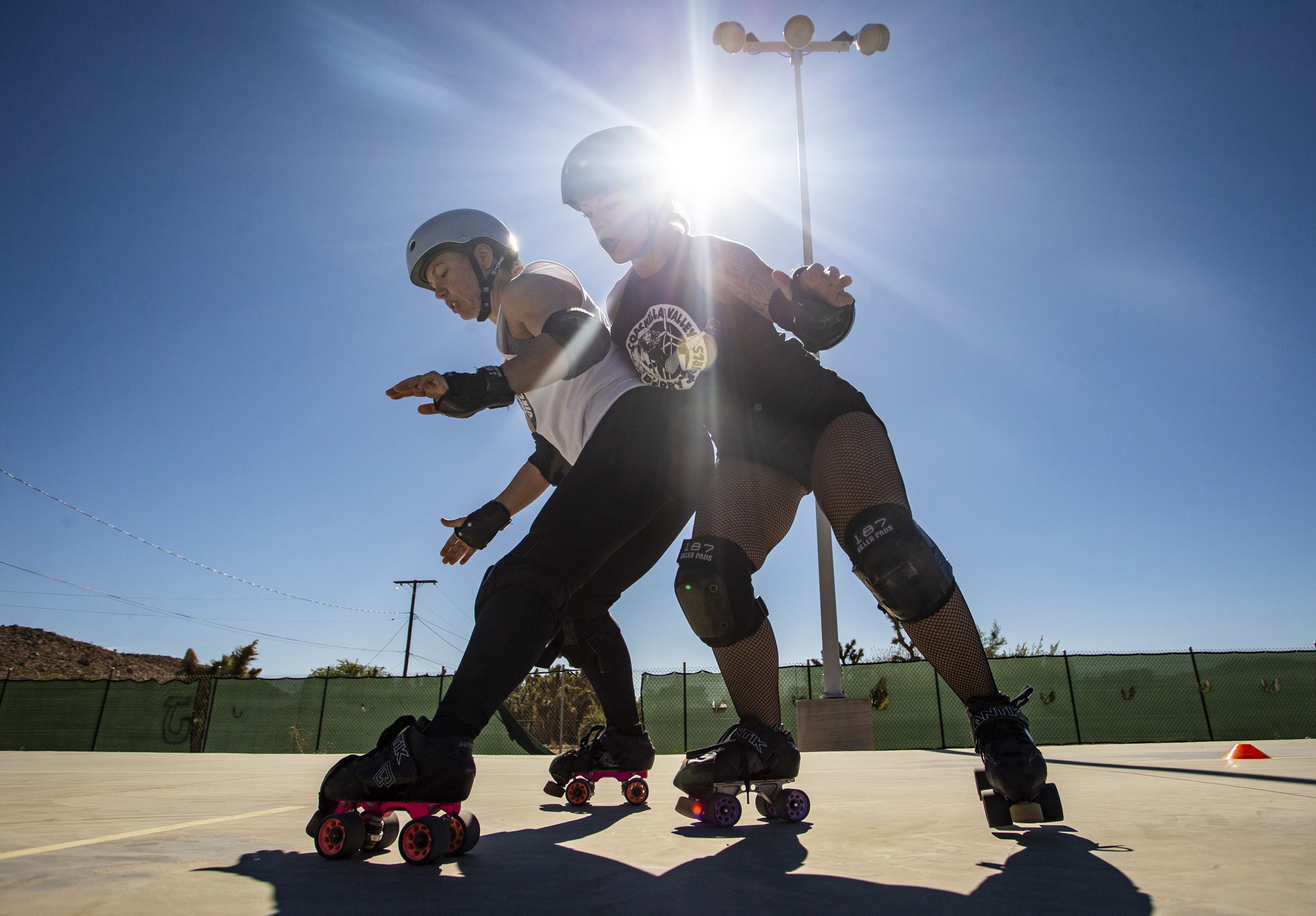
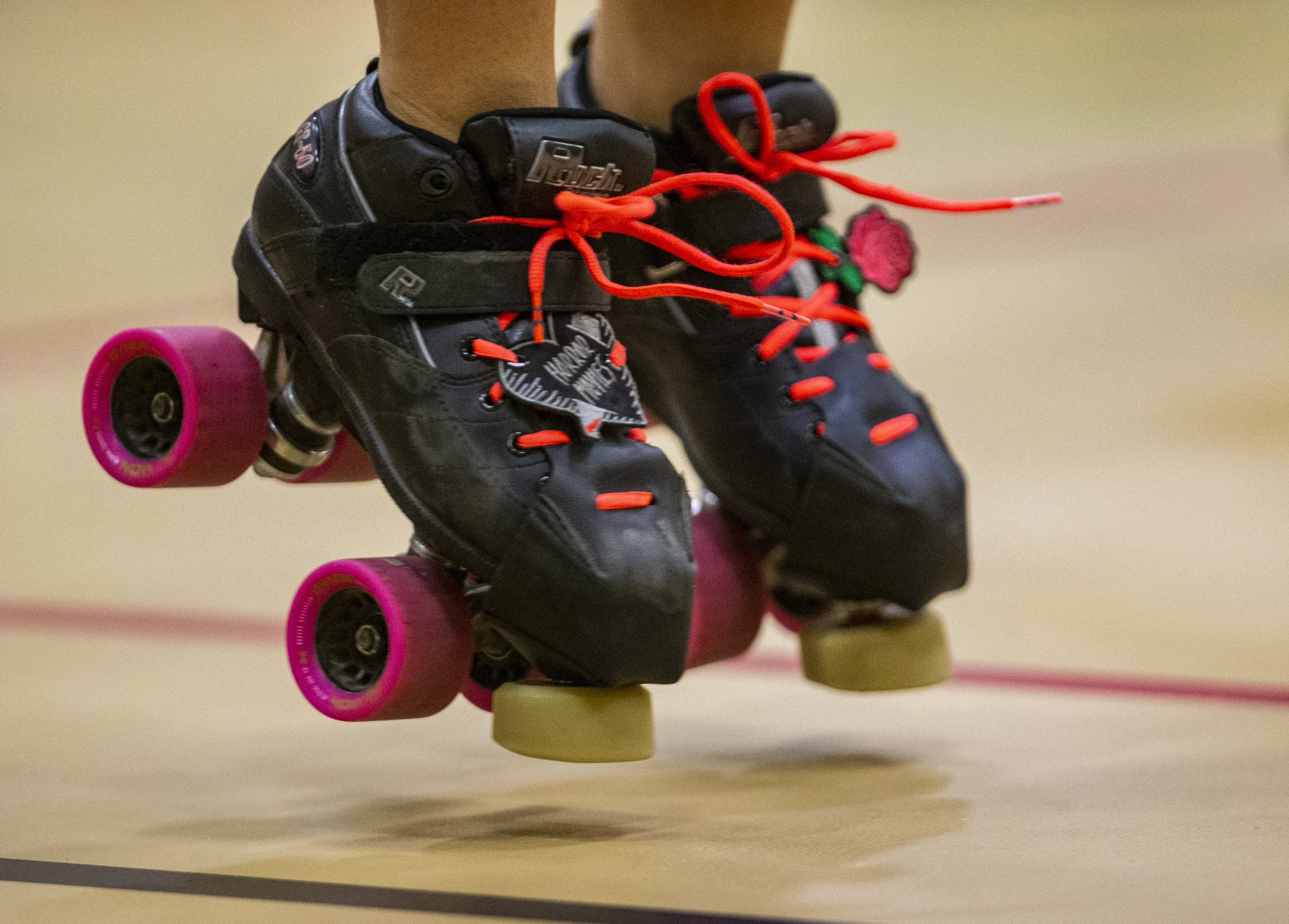

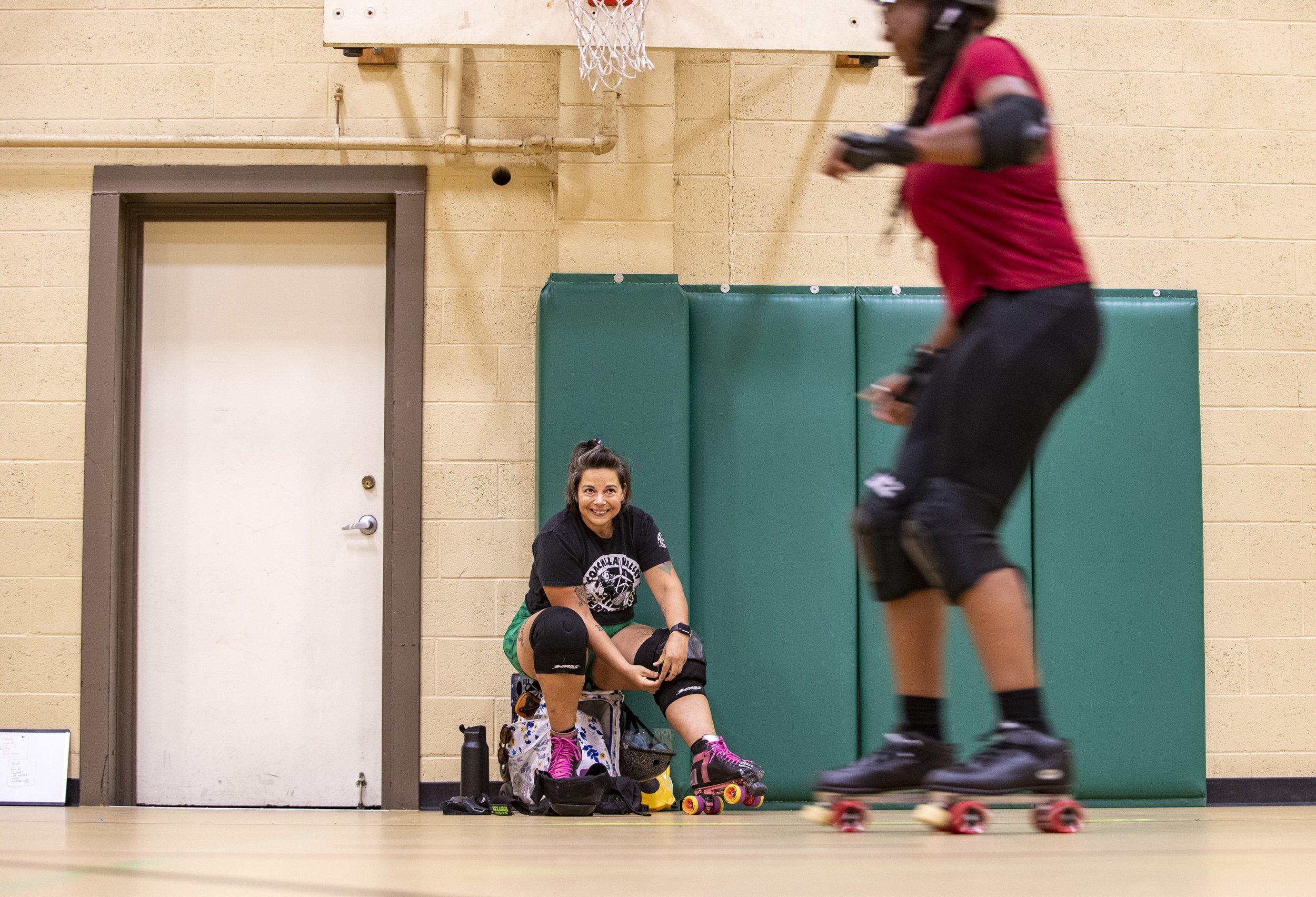
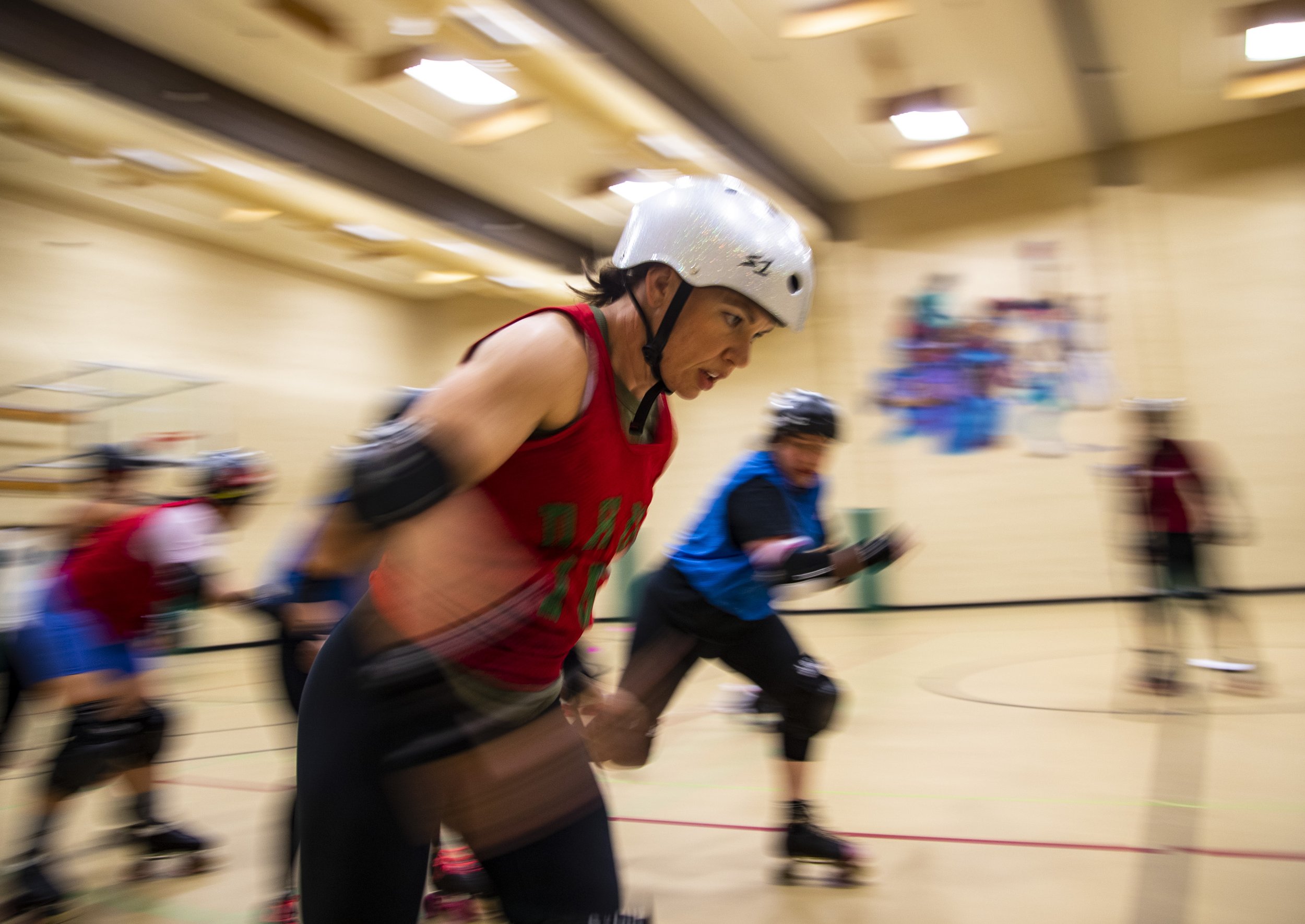
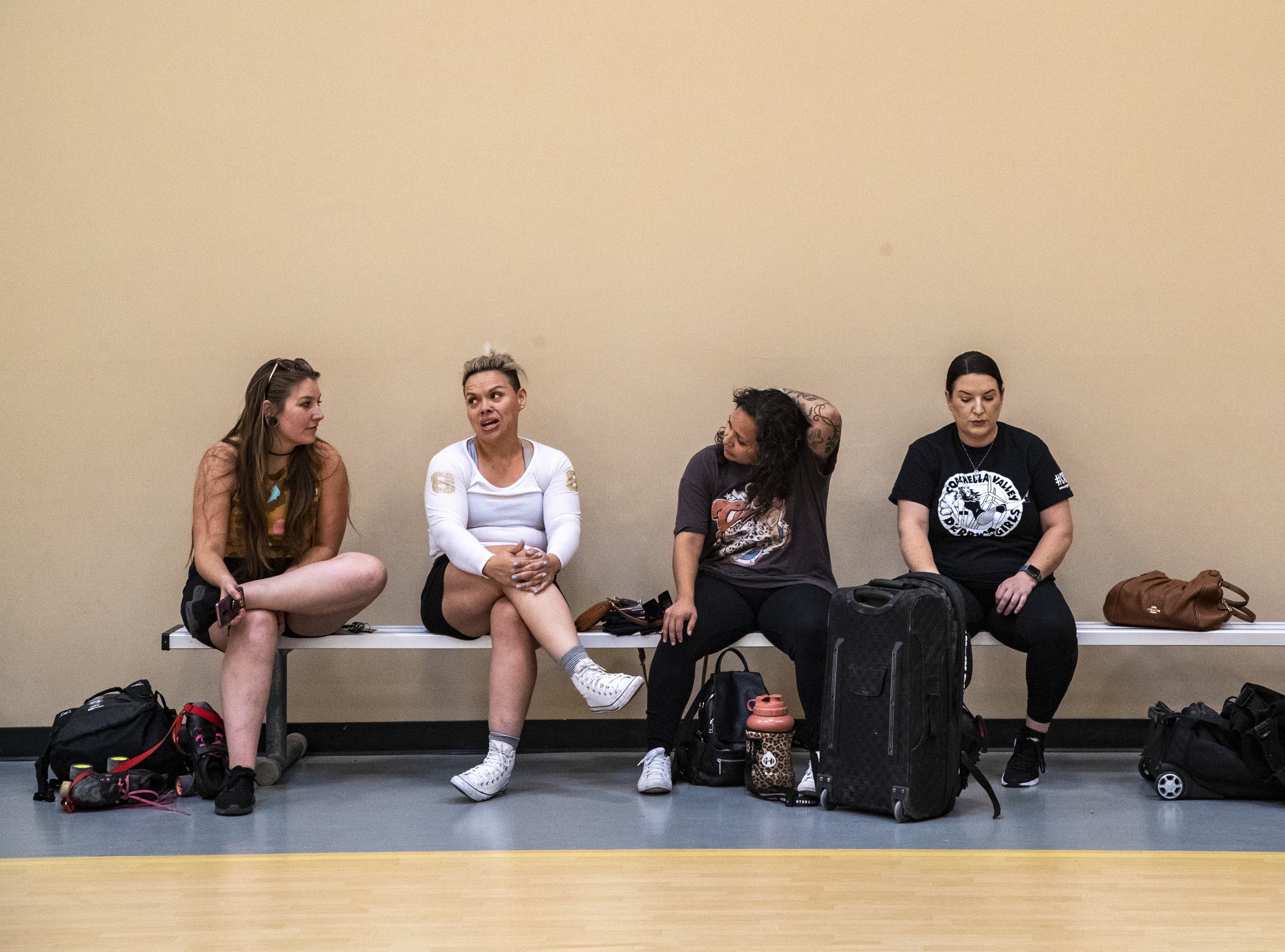
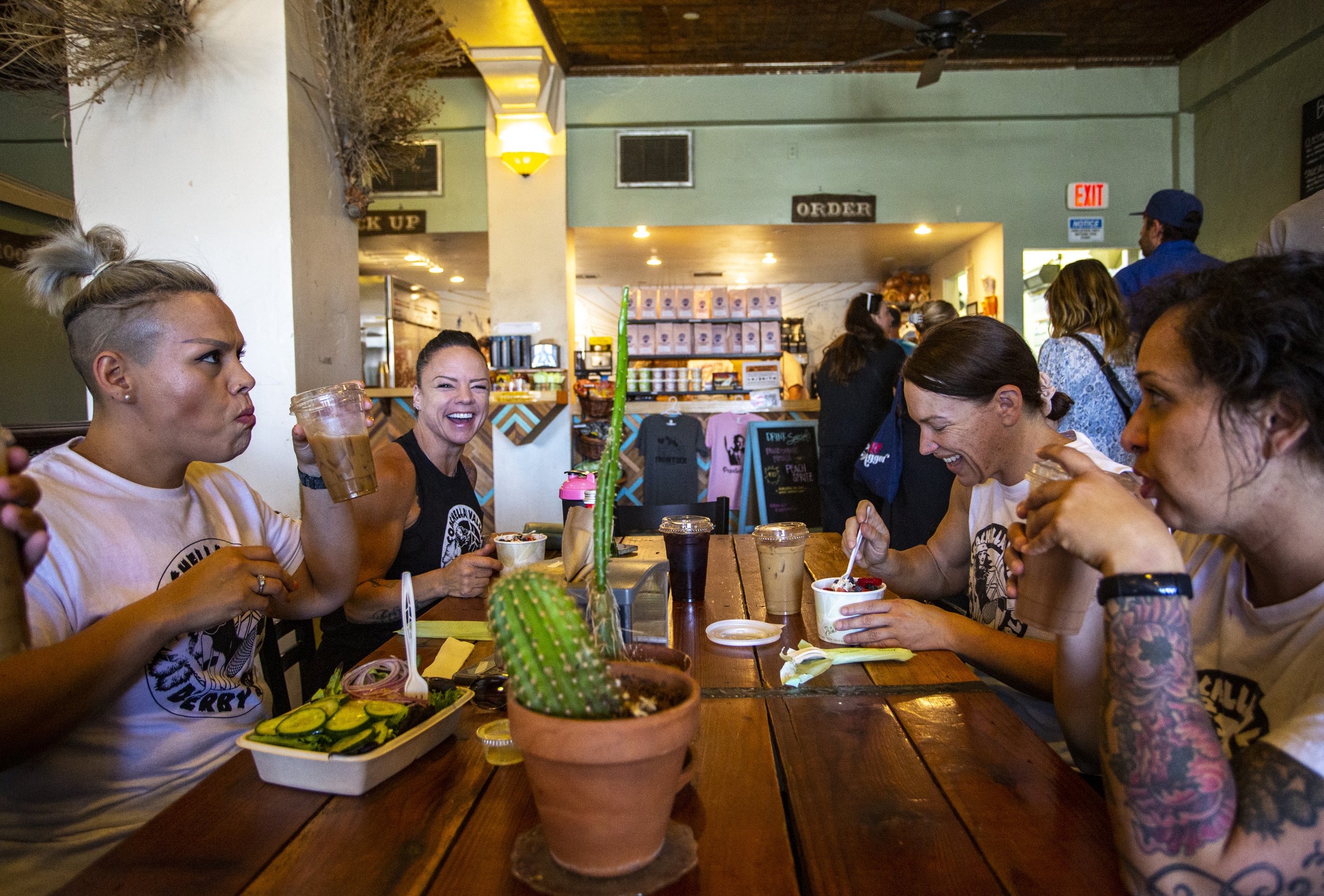
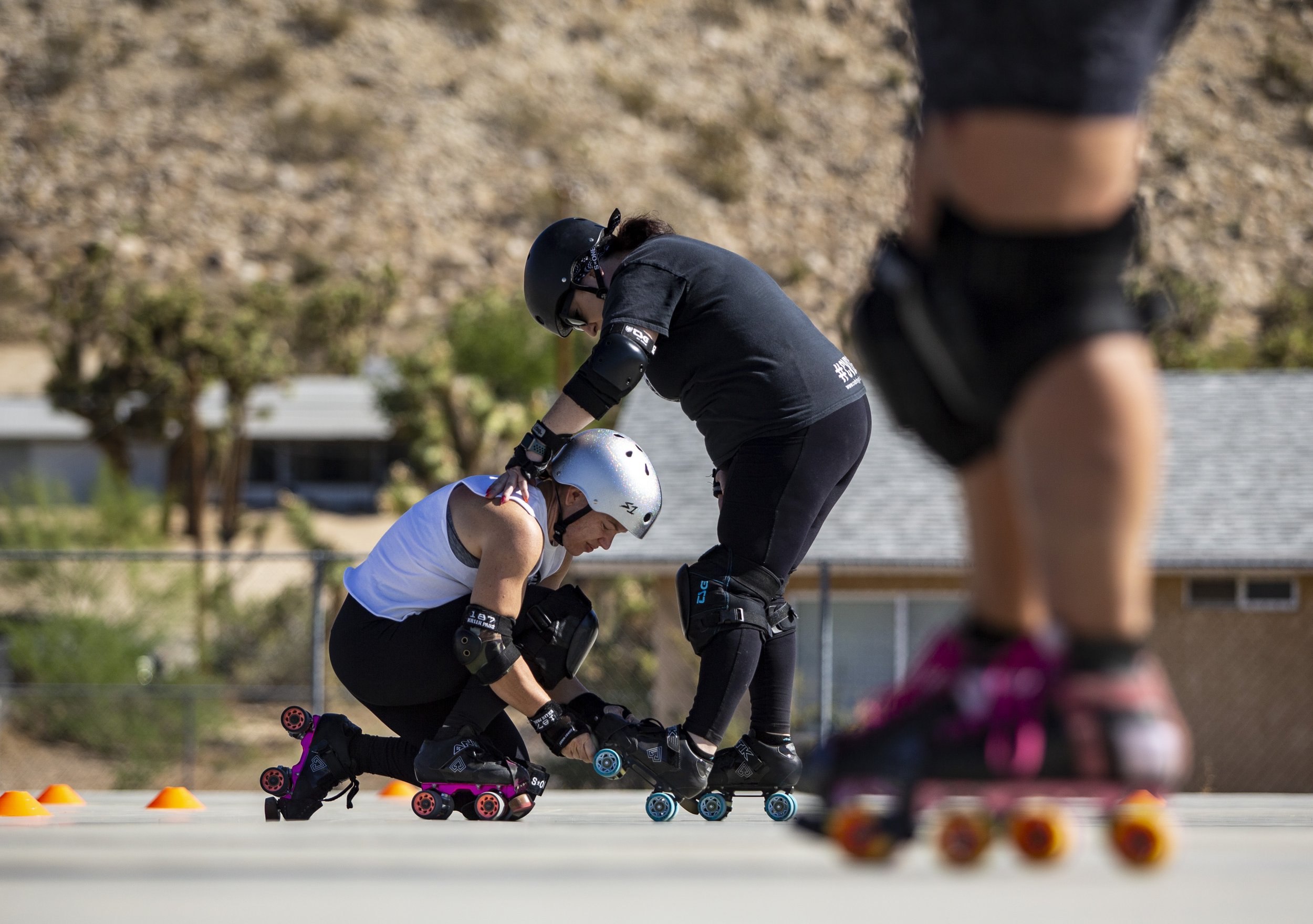
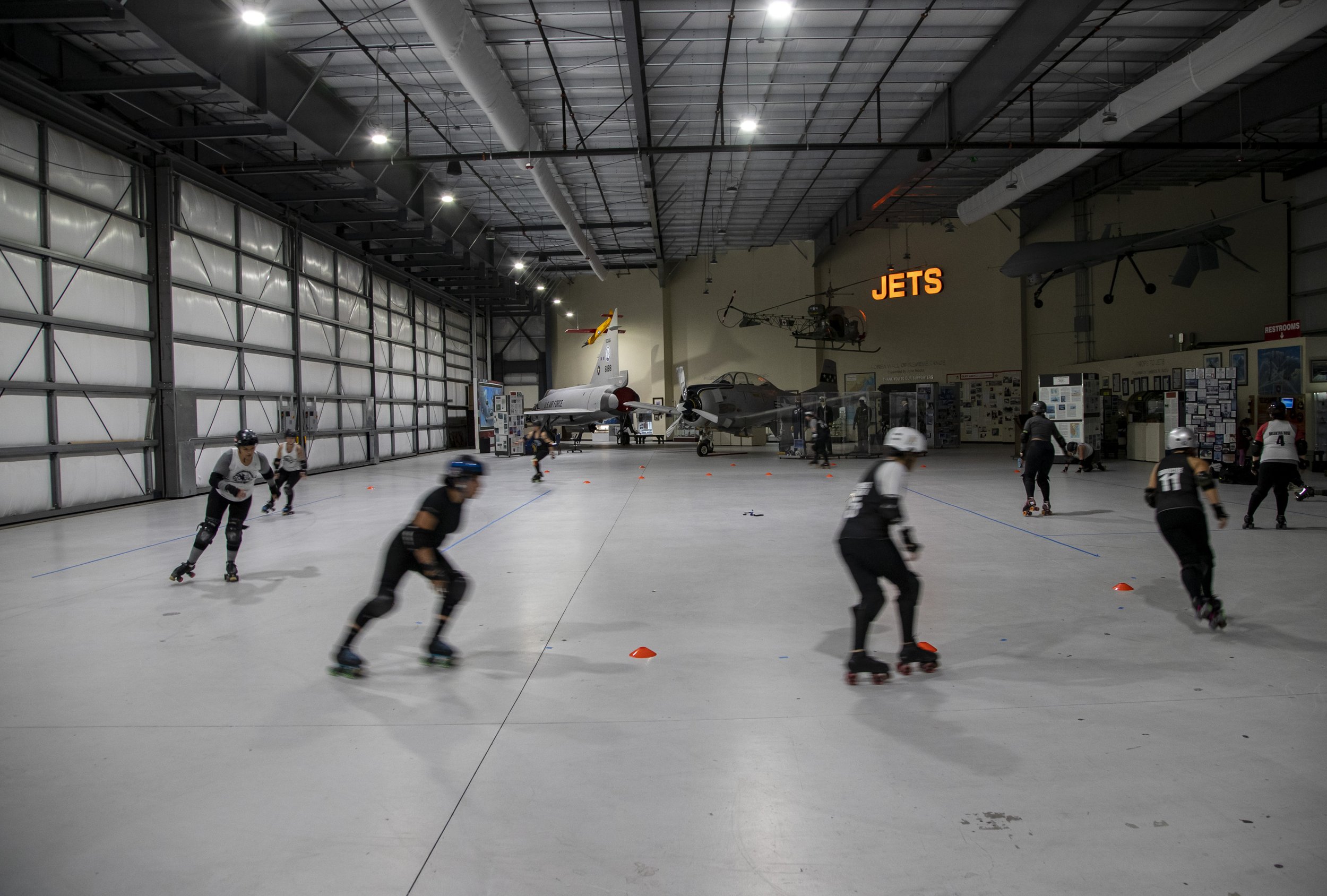
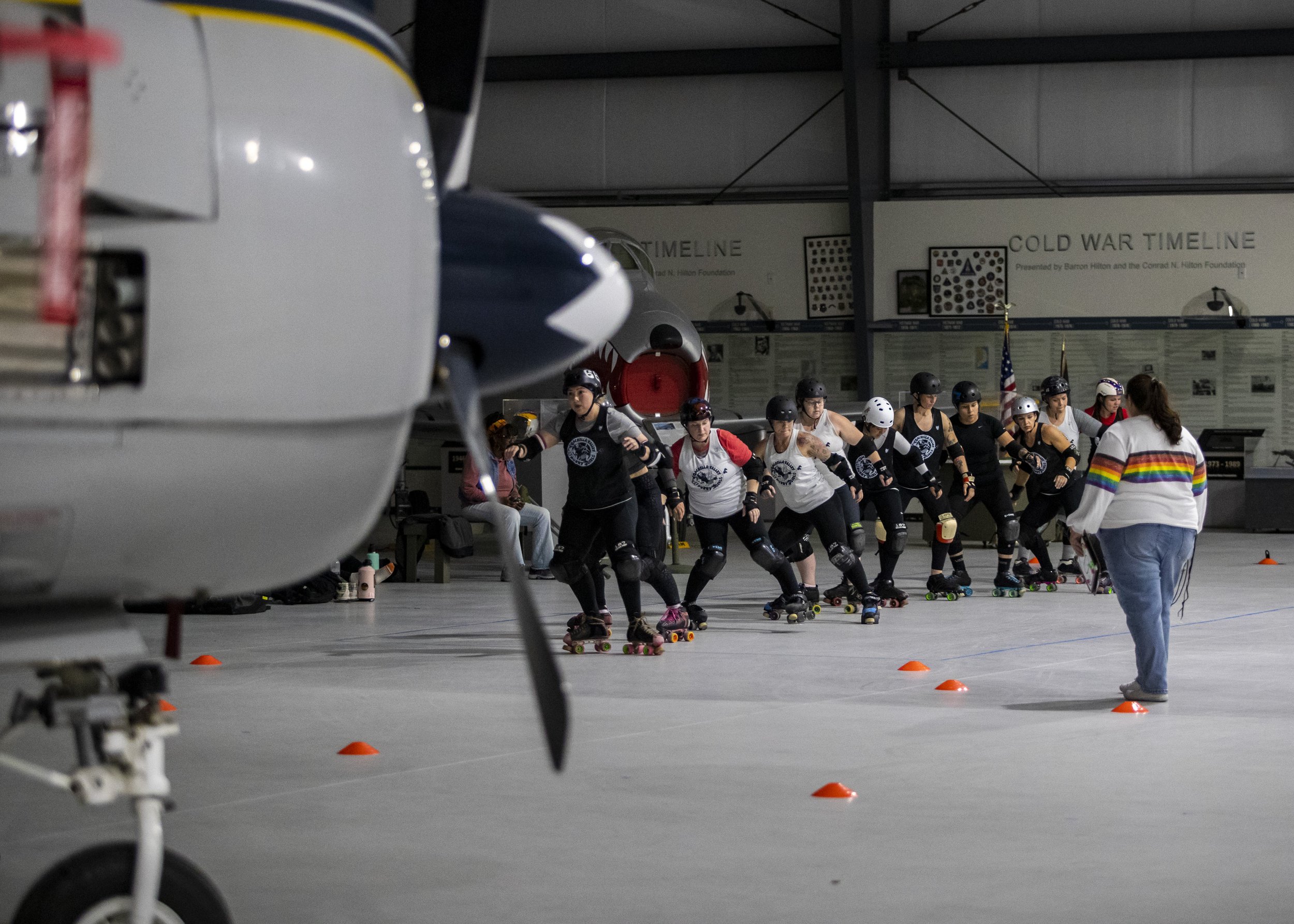
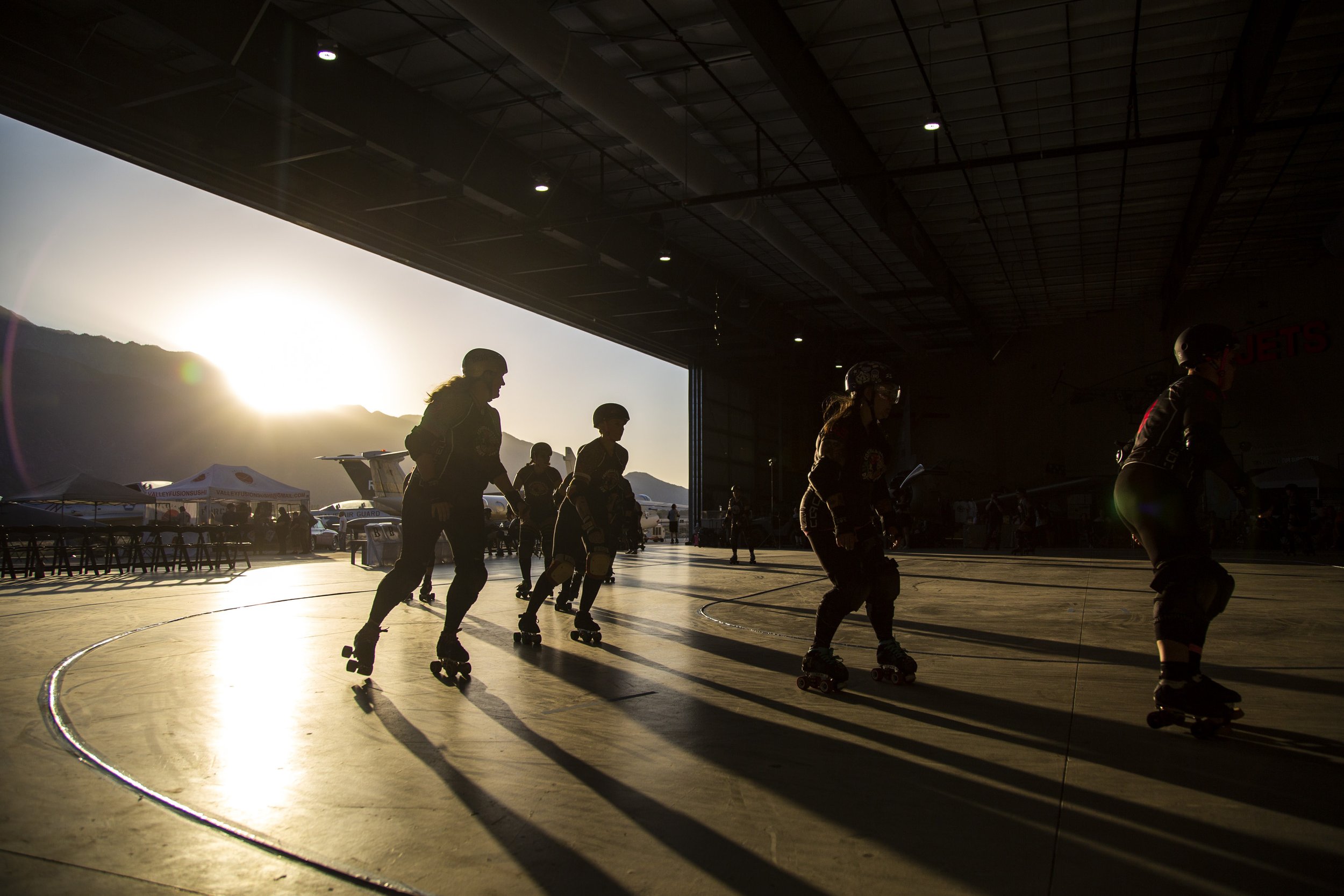
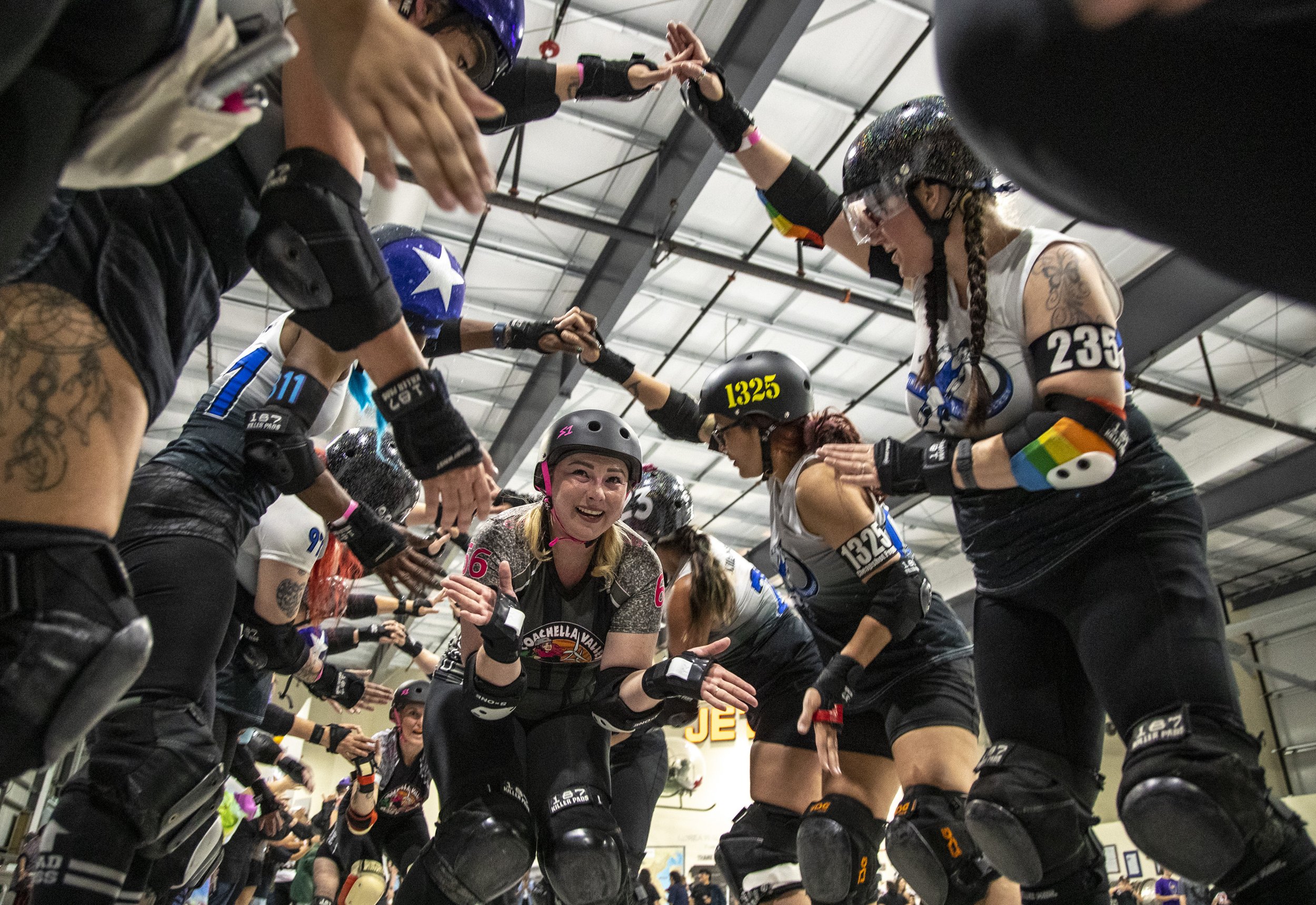

They get knocked down, but they get up again: Coachella Valley Derby Girls return to action
The Derby Girls will bring their battle home in the Cold War, Korea and Vietnam hangar of the Palm Springs Air Museum with warplanes and related memorabilia on the walls.
Story and photos by Andy Abeyta | The Desert Sun
While sipping cocktails poolside at the Palm Springs Hilton on a hot July afternoon last summer, current members of the Coachella Valley Derby Girls celebrated the team’s 10th birthday.
It was a big moment to recognize plenty of blood, sweat and tears. A major milestone, sure, but the group hopes plenty more remain.
Now consisting of about a dozen skaters spanning nearly three decades in age, the team has hosted only one bout in its history. It was in March of 2016 at the Empire Polo Club in Indio, and it didn’t make too big of a splash in the Coachella Valley.
This weekend, however, the Derby Girls are looking for some vindication when they hold their second-ever home bout.
As the Coachella Valley prepares to watch its newest team, the Firebirds, in the American Hockey League playoffs later this month, another team on skates has high hopes for their long-awaited homecoming.
It’s been a journey fraught with struggle. The major hang-up for the team has been finding a home venue. They need a hard surface with room for a large layout for the track and fans alike and a venue willing to give them a chance on what has been a shoestring budget.
They practice twice a week at the James O. Jessie Desert Highland Unity Center in Palm Springs and sometimes on a slab of concrete in Yucca Valley on weekends, but the former is simply too small of a space to host a bout and outdoor venues are out of the question for most of derby’s spring to fall season.
It’s been nearly a year in the making with plenty of disappointments, but at least for this season, the team has found a home venue. The Derby Girls will bring their battle home in the Korea and Vietnam hangar of the Palm Springs Air Museum with warplanes and related memorabilia on the walls.
The team faces Infinity Roller Derby of Monrovia at 7 p.m., April 15. Doors open 30 minutes early. Tickets are $10 at the door, and fans are asked to bring their own chairs.
Even with this recent success, however, the team still has to be creative.
The Derby Girls are still feeling the challenges of coming back from two seasons lost to the COVID-19 pandemic. They have experienced multiple coaching changes, lost a handful of veteran players and have restructured the team several times. Without home games, finding sponsorships has been a challenge. Plenty of fundraising is still needed to support their growth.
A sense of self
Ten years ago, Victoria Villarreal was lying in bed watching a documentary on roller derby. She didn’t know her future team had just been formed two months earlier, and she didn’t have much of an athletic background. She hadn’t picked up her old roller skates in some time but still thought, “I can do that.”
In hindsight, she says she needed to.
Villarreal had been going through a challenging time and while she was watching she was thinking about family. A cousin of hers had recently been paralyzed in a car crash and she grew up with an aunt who had been diagnosed with polio as a child.
“I can’t feel sorry for myself when I can use my legs and my feet,” she remembers thinking. “I’ve got to do something.”
When she learned about the team, she was invited to check out a practice. She was initially hesitant because of the time commitment, but five months later she was all in.
Villarreal had moved to the Coachella Valley in 2004 from Santa Monica to reset, had found a good job as a front office specialist at a local school and was happily raising her two kids. But now it was time for her to focus on herself.
Villarreal says it’s common for derby to help people through dark times.
“It saves your life mentally,” Villarreal said. “It’s something where you’re going to be built up and not broken down. Where you can get pushed down and get back up and it’s OK.”
It is a part of what has kept her coming back each season since. And now, Villarreal, 49, is the longest-running member of the team with 10 years of experience.
Cheyenne Hall, the team’s newly appointed captain, noticed a newfound sense of mental and physical strength after getting involved in the sport. It's a confidence that she too found translating into her everyday life.
“You only grow, you’re only a better version of yourself when you play derby,” Hall said. “They get to be a little bit stronger than maybe they were before, their voice is a little bit more heard than it was before. It only helps them in real life by playing derby.”
In Hall’s role as a blocker she’s constantly subjected to hard hits. With a laugh, she acknowledges the cliché sound of getting knocked down and getting back up, but on the track, they are living it. It brings out resilience.
A 40-year-old United States Army retiree and department of veterans affairs program manager, Hall is no stranger to overcoming physical and mental adversity. She fell into the sport quickly.
“I went on a Monday to check out practice,” Hall said. “Tuesday, I went and got gear. Wednesday, I had my skates on and was practicing. The rest is history.”
She and Villarreal agree that everyone is drawn to derby for a similar reason, despite often coming from completely different backgrounds. In that sense, the sport has earned a reputation as a place for misfits.
Derby doesn’t care if you’re big or small, tall or short. There’s no right body type and you don’t have to come teeming with athleticism, you just have to be ready to work hard. Misfits or not, derby is about empowerment.
Camaraderie on the track
Ginny Broderick, the team’s primary jammer (the point-scoring offensive player), says she doesn’t even want to know some of those things about her teammates. It isn’t the point.
A key point in the team’s handbook is its zero-tolerance policy for any hate speech. Most teammates steer clear of political talk or anything that could lead to division in the team.
“We play such a violent sport that I need to trust them fully to take care of me, they’re my sisters on the track,” Broderick said. “What I care about is do you have your skates on and can you get a hole in the wall for me to get through? Awesome.”
Off the track, Broderick has an unassuming look, but once her skates are on, she is known as an especially hard hitter. And her teammates certainly feel it at practice.
While no one wants to hurt a teammate in practice, Broderick rightfully feels a sense of duty to help keep her teammates ready for a hard hit, especially with rookie skaters on the team.
“I don’t want them to be shocked because no one has ever treated them that way or hit them in that manner,” she said. “So I will do that for them.”
The 2009 film Whip It is what Broderick, a 42-year-old accountant, remembers first sparked her interest in the sport. She hadn’t touched her skates since she was about 12 years old, but remembers having the same thought some of her teammates have described, “I can do that.”
Looking to the future
This year is all about growth for the Coachella Valley Derby Girls.
The process has been difficult to get new players comfortable on their skates while still challenging and pushing the veteran players at the same time. And it’s especially hard to do so while some of those veteran players have filled in as makeshift coaches.
Despite their struggles, the team has come back refreshed and with a clear direction on who they will be.
A new series of plays named for the cities of the Coachella Valley has been a key starting point entering this season. It highlights one of the team’s main goals: to represent the valley to the best of their ability.
The team aims to support local whenever possible, from vendors to sponsors to venue and event needs. They’re always looking for a way to support the Coachella Valley.
“It brings what we’ve been doing actually home,” Hall said. “We want to show our community all the work and dedication we’ve put into this sport.”
The biggest reward in this grueling sport, according to Hall, lies in sharing all the energy and dedication from the skaters. That’s what drives her to establish a future for her team.
Hall envisions walking away from derby some day with a permanent home venue, a solid practice location and a revolving door of new skaters arriving ready to learn. It’s all manageable, she says, and it’d mean a lot.
“(A place) to know they could go and grow and learn with this amazing sport and have a place where they fit in,” Hall says. “To be able to leave that kind of a legacy would be pretty magical."